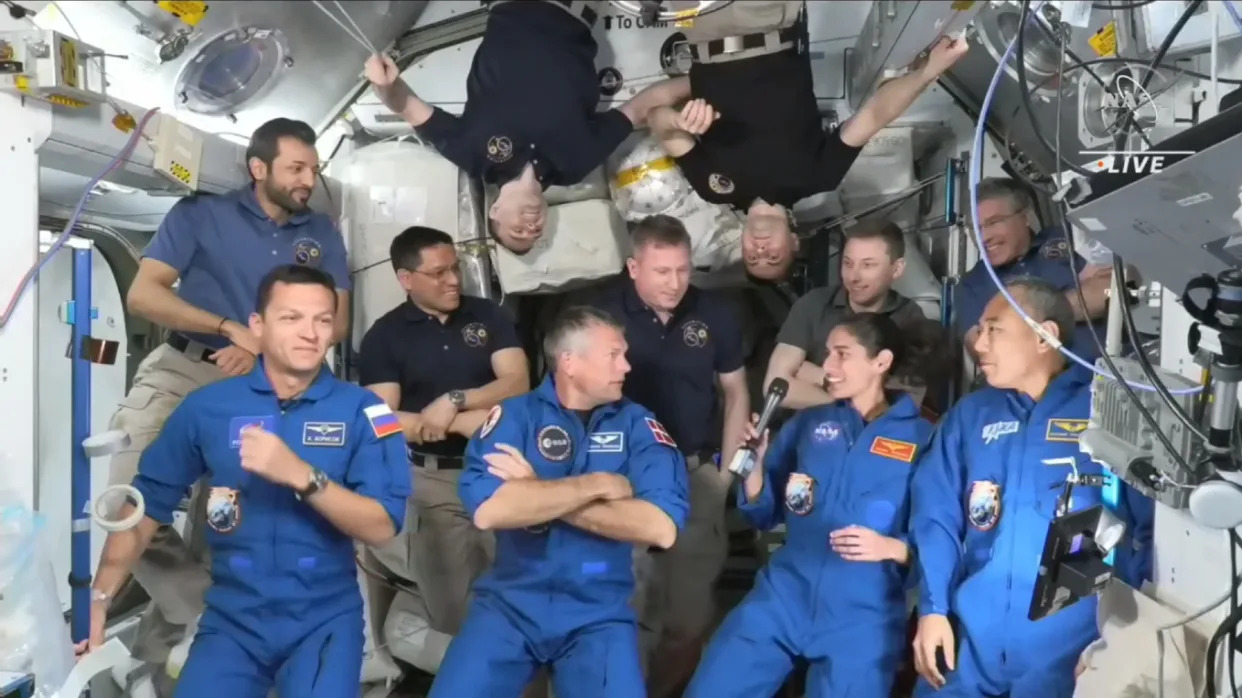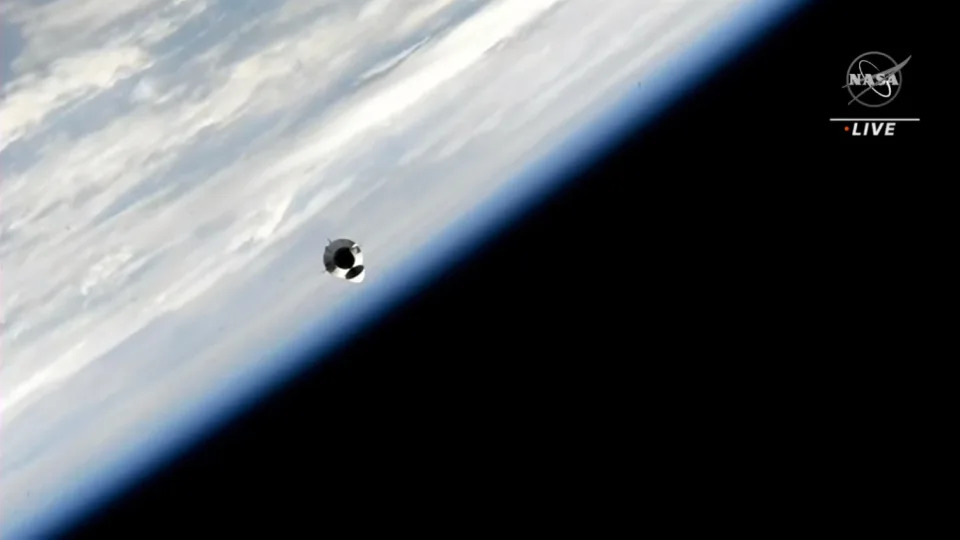Jackie Wattles, CNN
Sun, August 27, 2023

NASA
Sign up for CNN’s Wonder Theory science newsletter. Explore the universe with news on fascinating discoveries, scientific advancements and more.
Astronauts aboard a SpaceX Crew Dragon capsule docked Sunday at the International Space Station, concluding a one-day trip to rendezvous with the orbiting laboratory after launching from Florida.
The capsule made first contact with the space station at 9:16 a.m. ET Sunday and its hatches opened at 10:58 a.m. ET.
Hailing from four countries — making this mission, called Crew-7, the most nationally diverse SpaceX mission to date — the astronauts include NASA’s Jasmin Moghbeli, the mission commander; Danish astronaut Andreas Mogensen of the European Space Agency; Satoshi Furukawa of the Japan Aerospace Exploration Agency, or JAXA; and Russian cosmonaut Konstantin Borisov of Roscosmos.
The four launched aboard the Crew Dragon spacecraft atop a SpaceX Falcon 9 rocket from NASA’s Kennedy Space Center in Florida at 3:27 a.m. ET Saturday, and they’ve spent the last day free-flying aboard the 13-foot-wide capsule as it slowly maneuvered toward the space station.
Crew-7’s mission
Moghbeli, Mogensen, Furukawa and Borisov are joining the seven astronauts already on the orbiting laboratory.
The Crew-7 astronauts will spend about five days taking over operations from the SpaceX Crew-6 astronauts, who have been on the space station since March.
The new team will then bid farewell to the SpaceX Crew-6 astronauts, who will return home aboard their spacecraft, the Crew Dragon Endeavour, in the coming days.
This mission marks the eighth flight operated by NASA and SpaceX as part of the agency’s commercial crew program, which has been ferrying astronauts to the space station since SpaceX’s first crewed mission in 2020.
During their stay on the space station, which is expected to last about 180 days, the Crew-7 astronauts will pore through a slate of experiments. The research will include investigating the potential risk of dispersion of bacteria and fungi from human-led space missions. The team will analyze whether the microorganisms can be expelled from the space station’s vents and spewed into the vacuum of space.
Another project, from the ESA, will investigate how sleeping in the microgravity environment differs from Earth by analyzing astronauts’ brain waves while they doze off. Yet another experiment will look at the formation of biofilms in wastewater on the space station, which could be key to finding better ways to recycle water for drinking and hygiene while in space. (Yes, astronauts have long used recycled sweat and urine to drink and shower on the station.)
Furukawa, one of only two crew members who has flown to space, said during a news conference this month that he looks forward to reinhabiting the microgravity environment on the space station and delving into scientific pursuits, including research that could aid the development of new medicine and projects that could help inform how humans can one day explore the moon.
Mogensen is the other veteran of spaceflight on this mission. Borisov and NASA’s Moghbeli are both on their first.
“This is something I’ve wanted to do for as long as I can remember,” Moghbeli said during a July 25 news conference. “One of the things I’m most excited about is looking back at our beautiful planet. Everyone I’ve talked to who has flown already has said that was kind of a life-changing perspective.”
SpaceX Crew-7 Dragon capsule docks at space station with international astronaut team
Tariq Malik
Sat, August 26, 2023

Eleven astronauts in different color uniforms gather on a space station, two float upside down.
A SpaceX Dragon spacecraft arrived at the International Space Station Sunday (Aug. 27) to ferry a new astronaut crew to the orbiting lab to begin a half-year mission.
The Crew Dragon capsule Endurance docked at the International Space Station (ISS) at 9:16 a.m. EDT (1313 GMT), where it parked itself at a space-facing port on the outpost's U.S.-built Harmony module after flying a wide loop around the orbital outpost. Dragon and the station were soaring 261 miles above Australia at the time.
"Thank you so much," Crew-7 commander Jasmin Moghbeli of NASA radioed to SpaceX mission control after the successful docking. "I have to keep reminding myself that this is not a dream."

A space capsule with the blue edge of Earth behind
The docking marked the end of a nearly 30-hour journey for the capsule's four-person crew, which launched in the wee hours of Saturday from NASA's Pad 39A at the Kennedy Space Center in Florida. But it is also the start of something bigger, a six-month mission for Moghbeli and her three crewmates.
"This is the first step of the journey, the real mission begins now," Crew-7 pilot Andreas Mogensen of the European Space Agency radioed SpaceX. "Aboard the International Space Station, we have a lot of work ahead of us that we look forward to."
The Crew-7 astronauts opened between their Dragon and the ISS at 10:58 a.m. EDT (1458 GMT) to join the seven astronauts already aboard the station. All 11 astronauts then gathered for a short welcome ceremony to begin their joint mission.
RELATED STORIES:
— SpaceX Crew-7 astronauts will handle over 200 science experiments on ISS
— SpaceX to launch next Starship test flight 'soon,' Elon Musk says (photos)
— SpaceX Crew-6 and Crew-7 astronaut mission: Live updates
SpaceX's Crew-7 mission for NASA sent Moghbeli to the ISS with a truly international crew: pilot Mogensen of ESA; and mission specialists Konstantin Borisov of Russia's Roscosmos agency and Satoshi Furukawa of the Japan Aerospace Exploration Agency. The quartet is the first all-international crew, with members from four different agencies and countries, to fly on the same Dragon capsule.
The mission is the seventh operational commercial crew flight for NASA by SpaceX, and the company's eighth for the U.S. space agency overall (including a crewed test flight). It is SpaceX's 11th crewed mission when including three private astronaut flights in recent years. SpaceX is one of two private companies with multibillion-dollar contracts to fly astronauts to the ISS for NASA. (Boeing is the other, with its first crewed test flight delayed to early 2024.)
The Crew-7 astronauts will spend six months on the space station and relieve the four astronauts of NASA's Crew-6 mission, who are due to return to Earth on Sept. 2.
Crew-7 is the first spaceflight for Moghbeli, a U.S. Marine Corps Lieutenant Colonel who became the second Iranian-American to fly in space on the flight. It is also Borisov's first flight.
Related: Meet the astronauts of Crew-7 flying with SpaceX
While Morgensen and Furukawa have both flown to the ISS before, Morgensen is the first European ever to pilot a SpaceX Dragon capsule. SpaceX's Endurance capsule is also a space veteran, having flown the Crew-3 and Crew-5 astronaut missions to the station for NASA.
NASA and SpaceX included a special treat for Crew-7's arrival at the ISS on Sunday.

A space capsule with the blue edge of Earth behind bordered by black space
"We're gonna do a fly-around of the International Space Station and get some cool photos, and get that out to everybody to show what an awesome outpost we have," Joel Montalbano, NASA's space station program manager, told reporters after the launch.
That fly-aroundalso allowed cameras on the space station to capture spectacular views of the Dragon Endurance capsule with the blue Earth in the background.
Editor's note: This story was updated at 9:30 am on Aug. 27 to reflect the successful docking of SpaceX's Crew-7 Dragon capsule with its four astronaut crew.
No comments:
Post a Comment